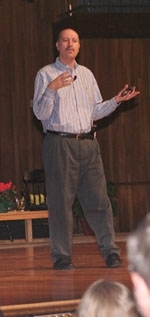The good news is that robots will not take over the world.
The not-so-good news is that you may not recognize it.
The theme for Saturday morning's annual Technology Day program in Kresge Auditorium was "The Future of Atoms in an Age of Bits." Featured speakers were Dean William A. Mitchell of the School of Architecture and Planning and Professors Yossi Sheffi, Rodney A. Brooks and Rosalind W. Picard.
First, the not-so-good news.
In discussing "E-Topia: Digital Telecommunications and the Future of Cities," Dean Mitchell looked ahead to an era when the separation of work sites and residences become blurred and screens play a larger role in commerce. "The changes are fundamental," he said. "We cannot effectively plan for future urban patterns without taking account of cyberspace."
Using ATMs and Amazon.com as examples, he predicted decentralization of browsing and purchasing, centralization of distribution, and back-office work taking place "wherever appropriately skilled labor is available at an attractive price."
He defined the key urban design question as: "find some combination of land use pattern, transportation and telecommunication that effectively supports the life of a community."
Professor Sheffi of civil and environmental engineering, director of the Center for Transportation Studies, discussed "Transportation Auctions and Exchanges." Noting that Amazon.com sales had increased 100 percent from 1996-99 at the same time losses went up 120 percent, he said, "you don't have to be an MIT graduate to detect that trend." He said the success of e-commerce would depend on developing more efficient systems of distribution.
Traditional traffic management strategies -- road sensors, variable signs and dynamic routing -- have one thing in common: "they don't work," Professor Sheffi said. He predicted that the new underground Southeast Expressway would become just as congested as the old highway.
Professor Sheffi suggested that the antidotes to traffic congestion might lie in smarter pricing -- by day and location, taking into account the amount of traffic, the weather and special events, perhaps even by entertaining bids in real time. "People said the rich will be better off," he said. "My answer is, 'the rich are better off already.'"
Now for the good news.
Dr. Brooks, the Fujitsu Professor of Computer Science and Engineering and director of the Artificial Intelligence Laboratory, spoke on "Flesh, Machines and the Physical World."
He said the answer to questions about robots taking over came to him six months ago when he looked at a double-amputee colleague -- "he was half-robot and half-person." At that point, he said, he realized that "we do not need to fear machines because we, the man-machines, will always be a step ahead of the machine-machines."
Technologies that unite flesh and machine include leg and arm prostheses, retinal and cochlear implants, electrodes in the thalamus, intercranial implants of neural circuits and nerve fibers growing through chips. Future technological breakthroughs will make longer and more comfortable lives possible.
"More and more of our bodies will be able to be changed and repaired," Professor Brooks said. "We will not become immortal. But we will live longer and longer, and we may become more intellectually powerful than in the past. We will not be the same species any more."
Associate Professor Picard of the Program in Media Arts and Sciences focused on "The Emotionally Smart Machine." "Emotion theorists don't really know what emotion is," she said, noting that one research paper offered 100 definitions of the word. Both too much and too little emotional input "wreaks havoc on reasoning," yet emotions are important "for rational and even scientific reasoning."
Professor Picard said human beings read emotional cues and react appropriately. Research projects are now developing computers with the ability to recognize and respond to aspects of emotion in humans. "Balance is missing in computers," she said.
Experiments have been conducted that show signs of helping autistic children learn about social-emotional cues and that use sensors to measure stress in Boston drivers. "We've had from 89-96 percent accuracy with the automated stress recognition algorithm we developed," Professor Picard said.
Panel discussions on "The New Neighborhood: Living and Working in Virtual Communities," "Clicks and Mortar: The Future of Physical U" and "Emerging Innovations and Entrepreneurship" were conducted in the afternoon. The daylong event was sponsored by the MIT Association of Alumni and Alumnae.
A version of this article appeared in MIT Tech Talk on June 7, 2000.






